With less than three months until the 2020 presidential election, a larger share of registered voters say they would support Joe Biden (53%) over Donald Trump (45%) if the election were held today. But when it comes to how strongly voters back their chosen candidate, 66% of Trump supporters say they support him strongly, while just 46% of Biden supporters say the same.
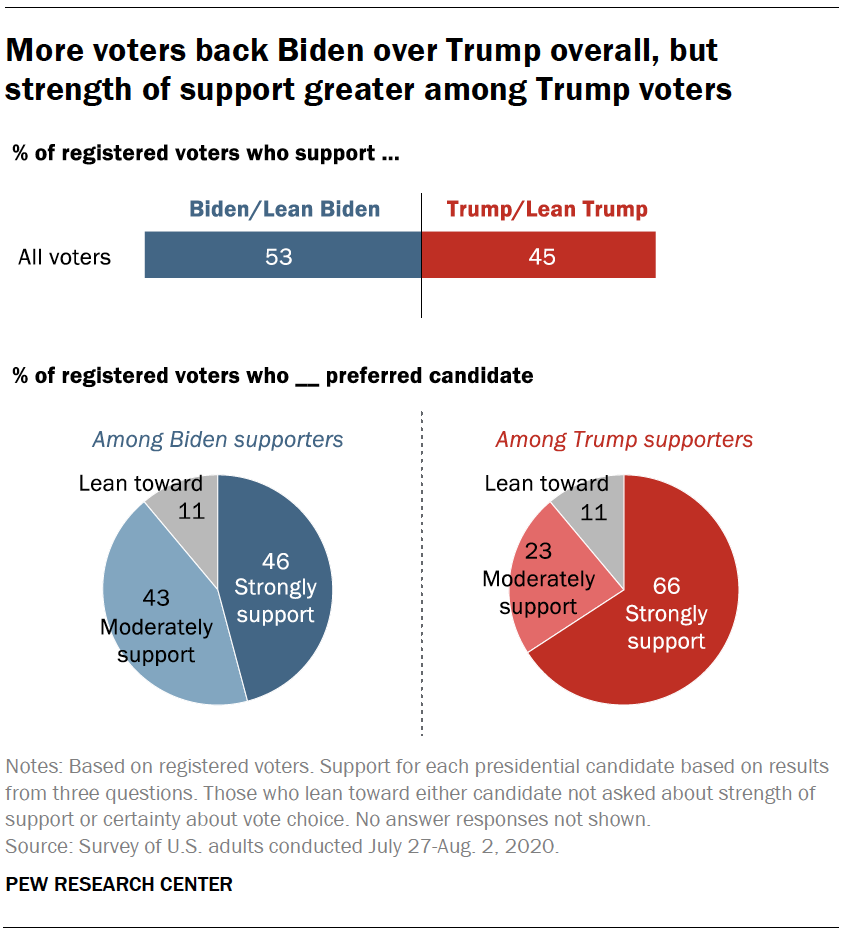 Nearly a quarter of voters who back Trump say they support him moderately (23%). Another 11% say they lean toward Trump (voters who declined to express a preference between the two major candidates in an initial question were asked which candidate they lean toward).
Nearly a quarter of voters who back Trump say they support him moderately (23%). Another 11% say they lean toward Trump (voters who declined to express a preference between the two major candidates in an initial question were asked which candidate they lean toward).
Support for Biden is more tepid; 43% of registered voters who say they would vote for Biden if the presidential election were held today say they moderately support him. About one-in-ten (11%) lean toward Biden.
The overwhelming majority of registered voters who currently support Biden and Trump (excluding those who lean toward either candidate) are locked into their choices. More than eight-in-ten Biden voters (84%) and Trump voters (85%) say they are certain to support their preferred candidate in the upcoming presidential election. Only about 5% of voters who support either of the two candidates say there is a chance they will change their mind (5% of Biden supporters, 4% of Trump voters).
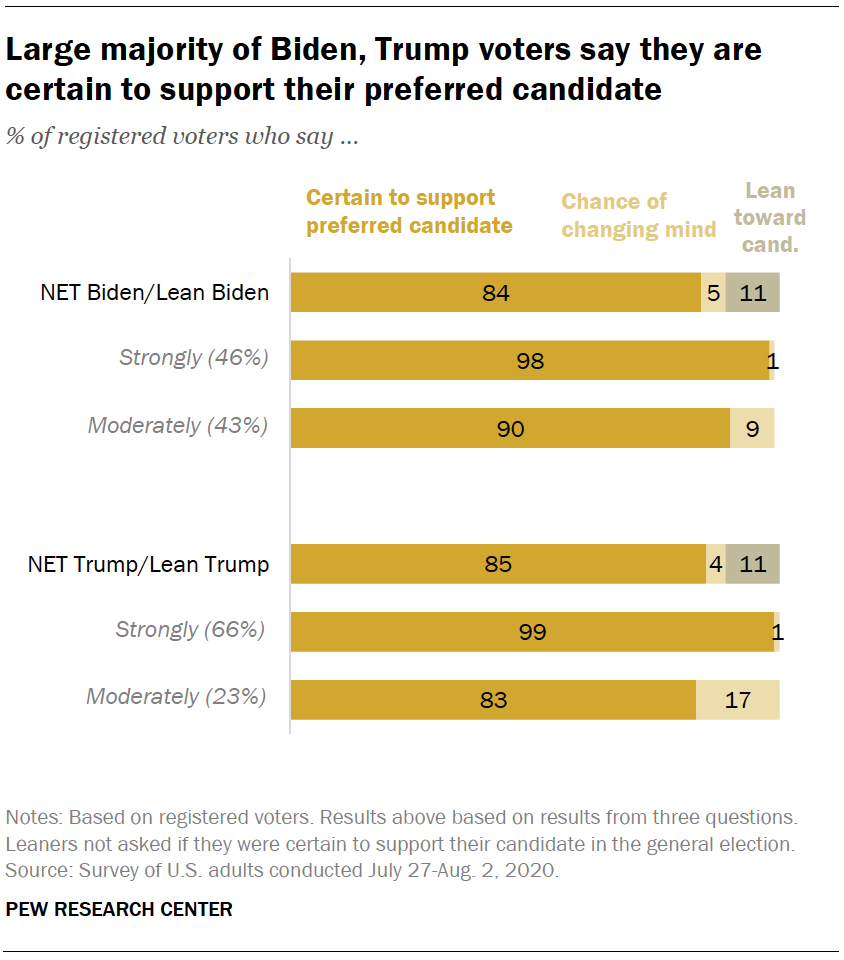 Among each candidate’s strong supporters, nearly all say they are certain to support their preferred candidate in the presidential election (98% of Biden’s strong supporters and 99% of Trump’s).
Among each candidate’s strong supporters, nearly all say they are certain to support their preferred candidate in the presidential election (98% of Biden’s strong supporters and 99% of Trump’s).
However, while a much larger share of Biden supporters support him moderately compared with Trump supporters (43% vs. 23%), they are more certain in their choice than are those who say they support Trump only moderately.
Among Biden’s moderate supporters, 90% say they are certain to support him for president, and 10% say there is a chance they will change their mind. Among Trump’s moderate supporters, 17% say there is a chance they will change their mind about their preferred candidate for the 2020 presidential election.
Voters who say they lean toward either of the two major candidates (10% of Biden’s support overall, 11% of Trump’s support overall) were not asked about the certainty of their choice.
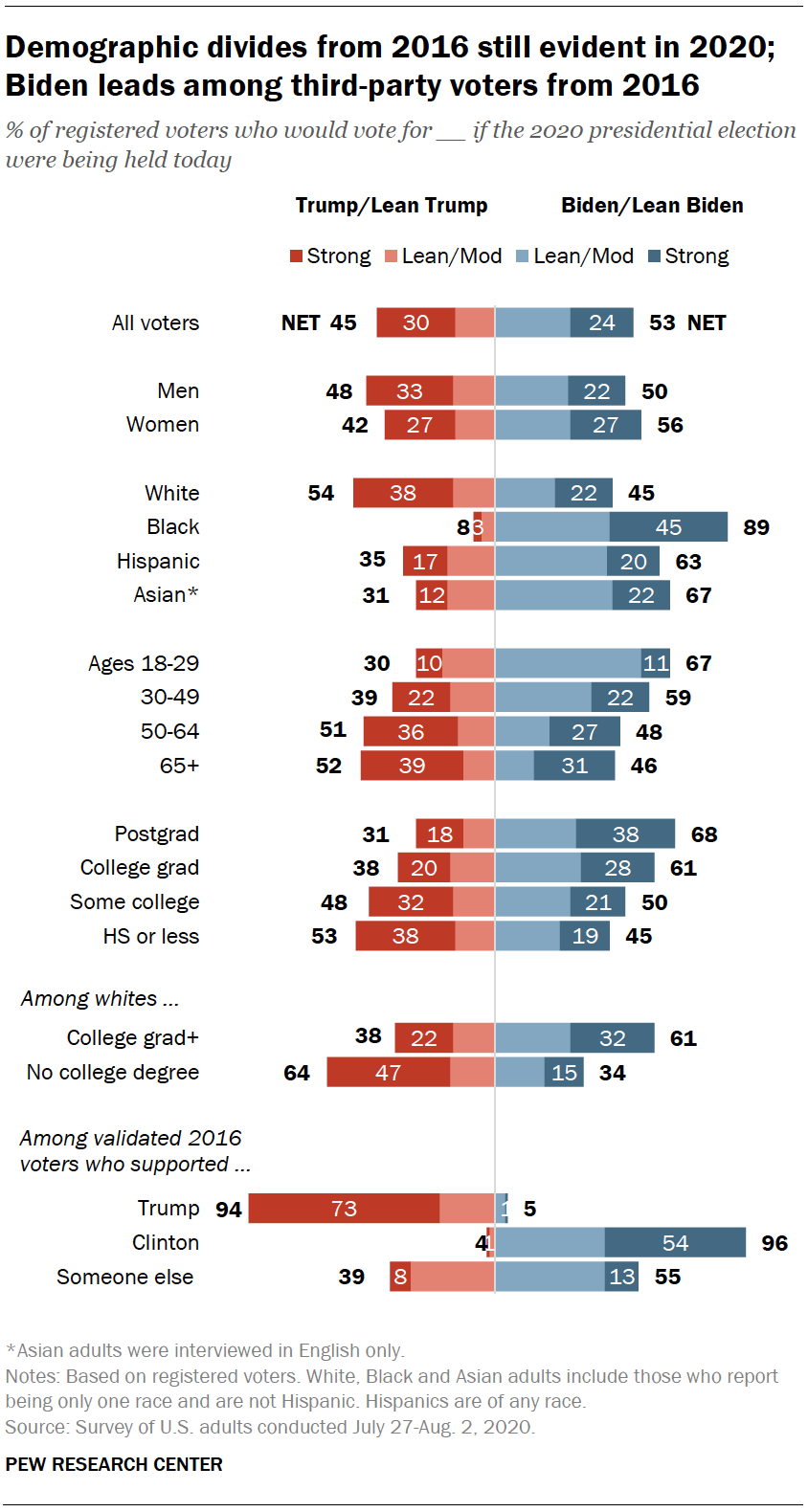 Many of the demographic divides that were evident in the 2016 presidential contest are just as wide today as they were four years ago – especially by race, education and gender. (See detailed tables for further information on voter preferences.)
Many of the demographic divides that were evident in the 2016 presidential contest are just as wide today as they were four years ago – especially by race, education and gender. (See detailed tables for further information on voter preferences.)
While Biden enjoys more support among women, Black, Hispanic, and Asian American voters, Trump fares better among older and less-educated voters. These divisions were evident earlier this summer, as well as four years ago.
And while gaps in support among these groups are not new, many of the differences in strength of support are striking. For example, while a 54% majority of white voters favor Trump, 38% support him strongly. Fewer white voters support Biden (45%), including just 22% who back him strongly.
Black voters overwhelmingly support Biden (89% to 8%). And close to half of Black voters (45%) support Biden strongly, a larger share than among his supporters in most other demographic groups.
Trump draws support from 53% of those with a high school diploma or less, including 38% who say they strongly support him for reelection. In contrast, 68% of voters with a postgraduate degree say they support Biden for president, including 38% who say they strongly support him.
The educational divide is even wider among white voters. Nearly two-thirds (64%) of white voters with no college degree say they support Trump; 47% strongly support him. By contrast, 61% of white voters with a four-year college degree or more say they would vote for or lean toward Biden – including about a third who say they strongly support him.
Today, substantial majorities of registered voters who cast ballots for Trump or Clinton in 2016 are largely sticking to their same party’s candidate. Among those voters who were matched to a voter file and reported supporting Trump in 2016, 94% say they will vote for Trump again this November; about 5% say they will support Biden.
The pattern is largely the same among 2016 Clinton voters: 96% say they will cast a ballot for Biden this fall, while just 4% say they will support Trump.
Among those voters who reported casting a ballot for someone other than Trump or Clinton in 2016, including Gary Johnson and Jill Stein, more say they would support Biden over Trump (55% vs. 39%) if the election were held today. Relatively small shares report either candidate strongly (8% say they support Trump strongly vs. 13% who say they support Biden strongly).
Registered voters divided on which candidate will win
Overall, registered voters are divided over who they think will win the 2020 November election: While 50% of voters believe that Trump will win the presidential election, 48% predict a victory for Biden.
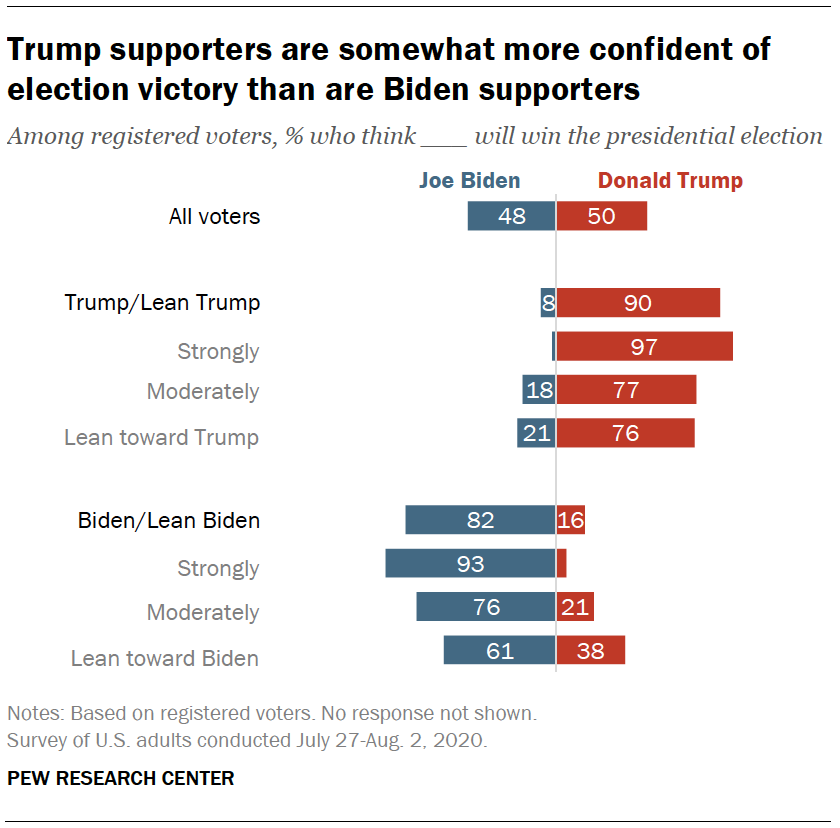 And although voters’ predictions for who will win the presidential election largely align with their candidate preference, voters who support Trump or lean toward voting for him are slightly more likely than Biden supporters to say that their candidate will win (90% vs. 82%).
And although voters’ predictions for who will win the presidential election largely align with their candidate preference, voters who support Trump or lean toward voting for him are slightly more likely than Biden supporters to say that their candidate will win (90% vs. 82%).
Throughout the 2016 presidential campaign, majorities of voters consistently expected a Hillary Clinton victory. In August of 2016, 55% said Clinton would win, compared with 42% who expected Trump to win.
Trump supporters are far more confident their candidate will win today than they were four years ago. Currently, 90% of Trump supporters expect him to win; at about the same point in the campaign four years ago, only 74% of Trump supporters said he would prevail over Clinton.
By contrast, roughly the same share of Biden supporters are confident of victory today (82%) as Clinton supporters four years ago (85%).
Today, voters who are more certain of their choice in candidate are more likely to expect that their candidate will win the 2020 election. Nearly all strong Trump supporters (97%) expect him to win, compared with 77% of his more moderate supporters. Similarly, among Biden supporters, those who support Biden strongly (93%) are more likely than those who support him moderately (76%) to expect him to win the November election.
But among voters who are more unsure of who they are voting for, those who lean toward voting for Trump (76%) are more likely than those who lean toward Biden (61%) to expect their candidate to win.
How Trump and Biden supporters would react to victory and defeat
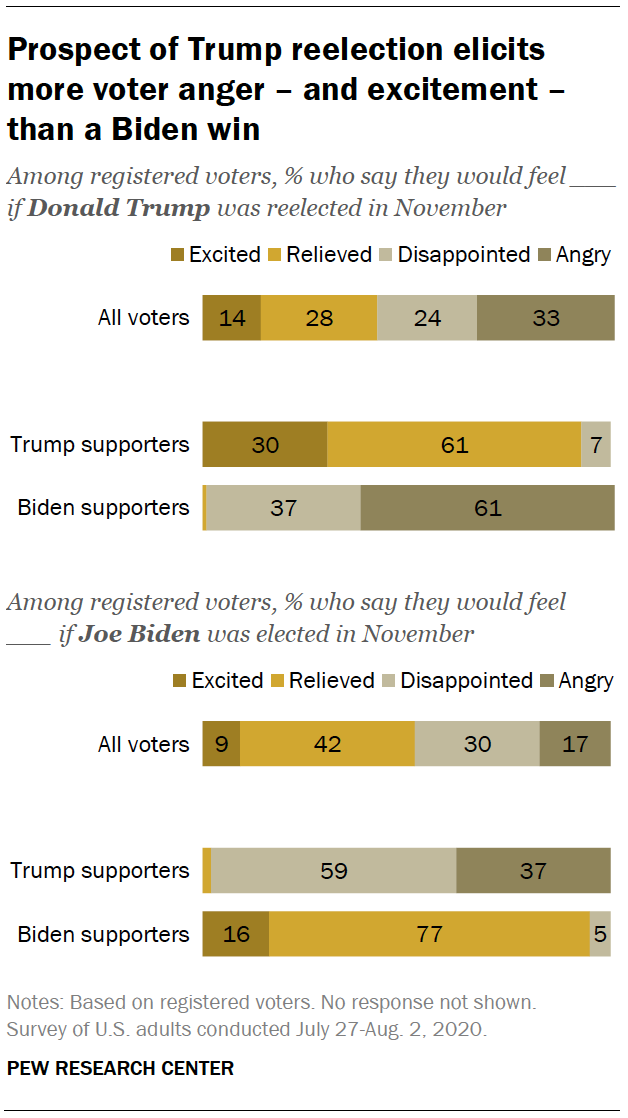 When asked about their reactions to the outcome of the November 2020 election, voters say they would have more positive reactions to Biden winning the election than to Trump being reelected president. And voters’ reactions to Trump’s possible reelection are more intense – both positively and negatively – than to a Biden victory.
When asked about their reactions to the outcome of the November 2020 election, voters say they would have more positive reactions to Biden winning the election than to Trump being reelected president. And voters’ reactions to Trump’s possible reelection are more intense – both positively and negatively – than to a Biden victory.
About half of registered voters (51%) say they would be excited or relieved if Biden was elected president, while 47% say they would be disappointed or angry.
Among voters who say they would react positively to a Biden victory, far more would be relieved (42%) than excited (9%). Among those who expect to react negatively, more say they would be disappointed (30%) than angry (17%).
More voters say they would react to a Trump victory with negative (57%) than positive (42%) emotions. Nearly twice as many voters say they would be angry if Trump wins reelection (33%) than if Biden is elected president (17%).
Yet somewhat more voters also say they would be excited by a Trump victory than a Biden victory.
Although both Trump and Biden supporters express positive reactions to their own candidate winning the November election, Trump supporters (30%) are about twice as likely to say to say they would be excited if their candidate won the 2020 election than Biden supporters (16%) are of their own candidate.
By contrast, Biden supporters are more likely to express relief about the possibility of their candidate winning. About eight-in-ten Biden supporters (77%) say they would be relieved if Biden were elected in 2020, compared with 61% of Trump supporters.
When it comes to the prospect of the opposing candidate winning the November election, Biden supporters are far more likely than Trump supporters to express anger. While a majority (61%) of Biden supporters say they would be angry if Trump won reelection, 37% of Trump supporters say they would feel angry if Biden won the presidential election.
On the other hand, Trump supporters are more likely to express disappointment toward Biden’s potential election. About six-in-ten Trump supporters say they would be disappointed if Biden won the November election, compared with 37% of Biden supporters who express this view of Trump’s potential reelection.
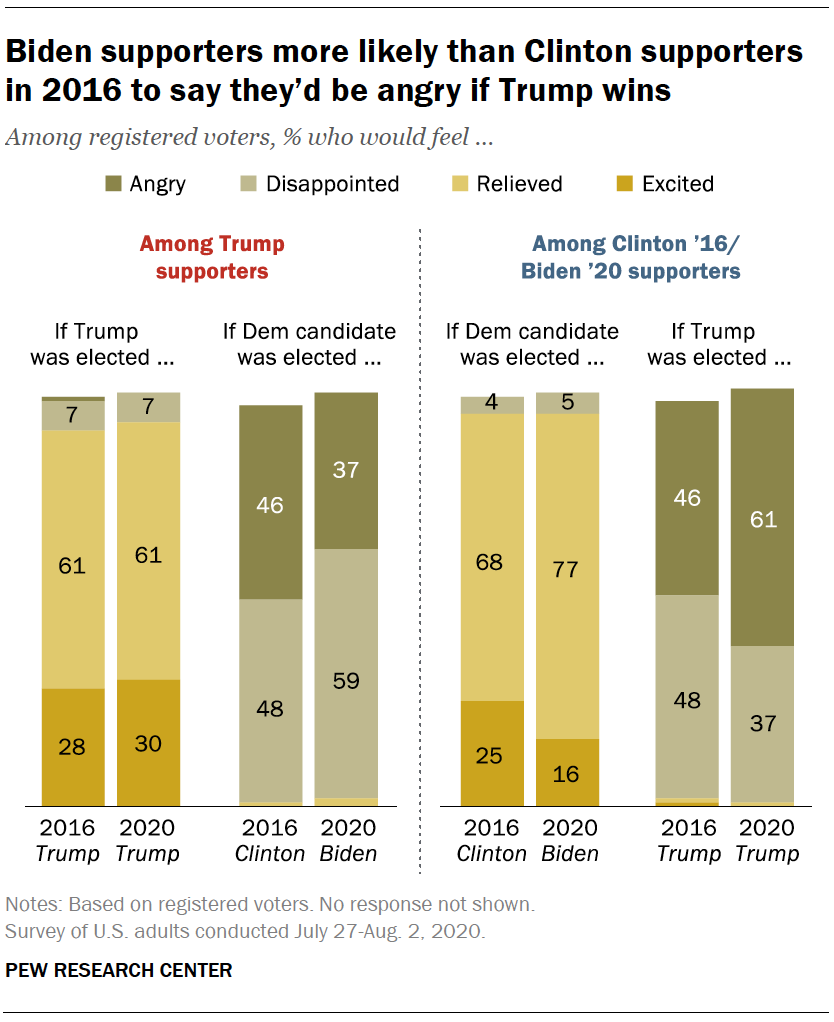 Biden supporters have different reactions to possible defeat and victory today than supporters of Hillary Clinton did in September 2016. In reaction to their own candidate winning, Biden supporters in 2020 (16%) are less likely than Clinton supporters were in 2016 (25%) to express excitement over the prospect of their own candidate winning. Instead, a larger share of Biden supporters say they would feel relief in the event he wins: 77% say they would be relieved if Biden won the November election. In 2016, 68% of Clinton supporters said they would feel relief.
Biden supporters have different reactions to possible defeat and victory today than supporters of Hillary Clinton did in September 2016. In reaction to their own candidate winning, Biden supporters in 2020 (16%) are less likely than Clinton supporters were in 2016 (25%) to express excitement over the prospect of their own candidate winning. Instead, a larger share of Biden supporters say they would feel relief in the event he wins: 77% say they would be relieved if Biden won the November election. In 2016, 68% of Clinton supporters said they would feel relief.
But the possibility of Trump’s reelection would elicit more anger from Biden supporters today than the possibility of Trump’s election did from Clinton supporters in 2016. A 61% majority of Biden supporters say they would be angry if Trump won reelection. In September 2016, 46% of Clinton supporters said they would be angry if Trump won.
Among Trump supporters, the outlook toward a possible Trump victory is little different than it was in 2016. As was the case then, far more Trump supporters say they would be relieved (61%) than excited (30%) if Trump wins. However, when asked about their potential reaction to Biden winning the presidential election in 2020, a smaller share (37%) say they would be angry than the share who said they would react in this way (46%) in 2016 when asked about a possible Clinton victory.


